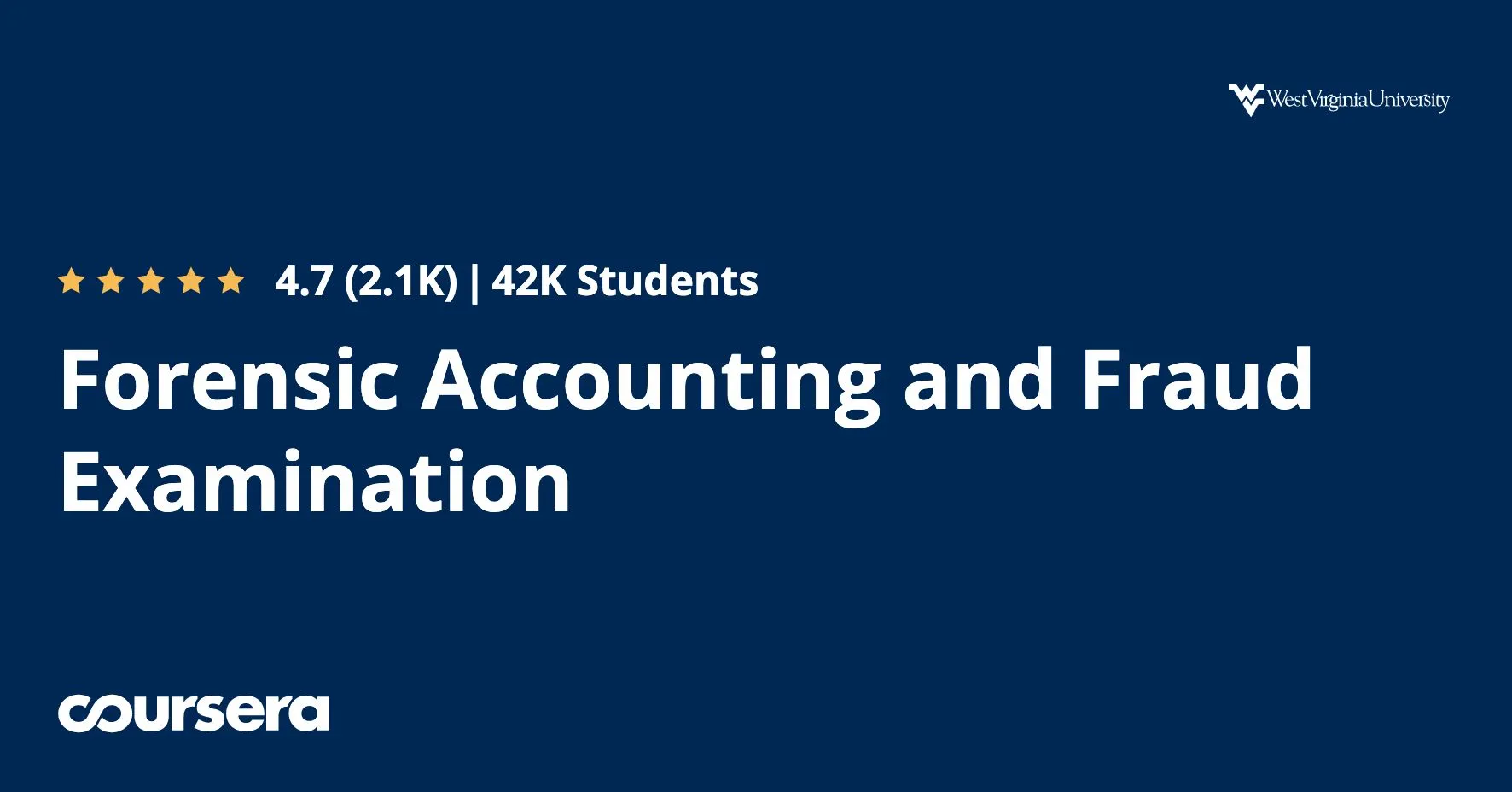
Forensic Accounting and Fraud Examination 
Forensic accounting and fraud examination are essential tools to uncover and prevent fraud. Professionals in this field use their expertise to investigate and identify perpetrators of financial crimes. ▼
ADVERTISEMENT
Course Feature
![]() Cost:
Cost:
Free
![]() Provider:
Provider:
Coursera
![]() Certificate:
Certificate:
No Information
![]() Language:
Language:
English
![]() Start Date:
Start Date:
Self Paced
Course Overview
❗The content presented here is sourced directly from Coursera platform. For comprehensive course details, including enrollment information, simply click on the 'Go to class' link on our website.
Updated in [March 06th, 2023]
This course provides an overview of forensic accounting and fraud examination. It covers the elements of fraud, why people commit fraud, and fraudster demographics. It also features a case study of Randy Pierce, the accidental fraudster. Students will gain an understanding of the various types of fraud, the motivations behind it, and the methods used to detect and prevent it. They will also learn how to identify and investigate fraud cases, and how to develop strategies to prevent fraud in the future.
[Applications]
The application of this course can be seen in the field of forensic accounting and fraud examination. After completing this course, students will have a better understanding of the elements of fraud, why people commit fraud, and the demographics of fraudsters. They will also be able to apply the case study of Randy Pierce, the accidental fraudster, to their own investigations. With this knowledge, students will be better equipped to identify and investigate fraud in their own organizations.
[Career Paths]
Forensic accounting and fraud examination is a growing field that is becoming increasingly important in the business world. Forensic accountants are responsible for investigating and analyzing financial records to detect and prevent fraud. They use their knowledge of accounting principles and investigative techniques to uncover financial irregularities and identify potential fraudsters.
The job of a forensic accountant requires a combination of accounting and investigative skills. They must be able to analyze financial records, identify discrepancies, and determine the source of the fraud. They must also be able to communicate their findings to law enforcement and other stakeholders.
[Title]Data Analytics
[Description]Data Analysis Techniques
Data Visualization
Data Mining
Data Science
Data analytics is a rapidly growing field that is becoming increasingly important in the business world. Data analysts are responsible for collecting, analyzing, and interpreting data to identify trends and patterns. They use their knowledge of data analysis techniques, data visualization, data mining, and data science to uncover insights and make decisions.
The job of a data analyst requires a combination of technical and analytical skills. They must be able to collect and organize data, identify patterns, and draw conclusions. They must also be able to communicate their findings to stakeholders and make recommendations.
[Title]Cyber Security
[Description]Network Security
Data Security
Application Security
Threat Intelligence
Cyber security is a rapidly growing field that is becoming increasingly important in the business world. Cyber security professionals are responsible for protecting networks, data, and applications from cyber threats. They use their knowledge of network security, data security, application security, and threat intelligence to identify and mitigate risks.
The job of a cyber security professional requires a combination of technical and analytical skills. They must be able to identify potential threats, develop security policies, and implement security measures. They must also be able to communicate their findings to stakeholders and respond to security incidents.
[Education Paths]
1. Bachelor of Science in Accounting: This degree path provides students with a comprehensive understanding of accounting principles and practices, as well as the ability to analyze financial data and make informed decisions. Students will learn how to prepare financial statements, analyze financial data, and use accounting software. Additionally, they will gain an understanding of the legal and ethical aspects of accounting, as well as the ability to detect and prevent fraud.
2. Master of Science in Forensic Accounting: This degree path provides students with an in-depth understanding of the principles and practices of forensic accounting. Students will learn how to investigate financial crimes, analyze financial data, and use forensic accounting software. Additionally, they will gain an understanding of the legal and ethical aspects of forensic accounting, as well as the ability to detect and prevent fraud.
3. Doctor of Philosophy in Fraud Examination: This degree path provides students with an advanced understanding of the principles and practices of fraud examination. Students will learn how to investigate financial crimes, analyze financial data, and use fraud examination software. Additionally, they will gain an understanding of the legal and ethical aspects of fraud examination, as well as the ability to detect and prevent fraud.
4. Certificate in Fraud Examination: This degree path provides students with a basic understanding of the principles and practices of fraud examination. Students will learn how to investigate financial crimes, analyze financial data, and use fraud examination software. Additionally, they will gain an understanding of the legal and ethical aspects of fraud examination, as well as the ability to detect and prevent fraud.
Course Syllabus
The Predator Fraudster
Attributes of a Predator
Internal Control Concepts
How to Detect and Prevent Financial Statement Fraud - Crazy Eddie
Pros & Cons

Stimulates critical thinking.

Videos with real fraudsters.

Interesting and diverse information.

Superficial approach.

Outdated examples.

Quiz questions require inference.
Course Provider

Provider Coursera's Stats at AZClass
Discussion and Reviews
0.0 (Based on 0 reviews)
Explore Similar Online Courses

Learn Python 3 From Scratch

Top Ten Mistakes New Designers Make

Python for Informatics: Exploring Information

Social Network Analysis

Introduction to Systematic Review and Meta-Analysis

The Analytics Edge

DCO042 - Python For Informatics

Causal Diagrams: Draw Your Assumptions Before Your Conclusions

Whole genome sequencing of bacterial genomes - tools and applications

Goods and Service Tax in India : A Brief Introduction

The Basics of Business Accounting


Start your review of Forensic Accounting and Fraud Examination